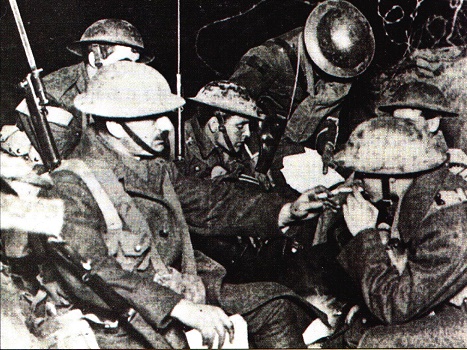
Night in No Man's Land

Introduction
This photograph shows a British night patrol 'lighting up'. Romantic photographs like these were set up
in advance, and taken as propaganda for the
people in England.
In 1978, the historian Lynn Macdonald published a book on the Battle of Passchendaele. "It is all true," she remarked, "or rather it is compiled from more than 600 true stories and eyewitness accounts of men and women who were there in the blood-bath."
In Source 1 one of her interviewees, Alfred Angel, remembers sheltering with his troop in craters in No Man's Land one night, waiting to go 'over the top'.
In this, the third lesson on the feelings of men on the Western Front, you will learn that the feelings of different soldiers in the same situation differed depending on their role and point of view within that situation.
After you have studied this webpage, answer the question sheet by clicking on the 'Time to Work' icon at the top of the page
1. Memories of Second Lieutenant A Angel, Royal Fusiliers, 38th Division (1978)
Most of my boys were young Londoners, just eighteen or nineteen, and a lot of them were going into a fight for the first time. Regularly during the night I crawled round to check on my scattered sections, having a word here and there and trying to keep their spirits up. The stench was hornble, for the bodies were not corpses in the normal sense. With all the shell-fire and bombardments they'd been continually 'disturbed, and the whole place was a mess of filth and slime and bones and decomposing bits of flesh. Everyone was on edge and as I crawled up to one shell-hole I could hear a boy sobbing and crying. He was crying for his mother. It was pathetic, really, he just kept saying over and over again, "Oh Mum! Oh Mum!"
Nothing would make him shut up and while it wasn't likely that the Germans could hear, it was quite obvious that when there were lulls in the shell-fire the men in the shell-holes on either side would hear the lad and possibly be affected.
Depression, even panic, can spread quite easily in a situation like that. So I crawled into the shell-hole and asked Corporal Merton what was going on. He said, "It's his first time in the line, sir. I can't keep him quiet, and he's making the other lads iittery." Well the other boys in the shell-hole obviously were jittery and, as one of them put it more succinctly, "fed up with his bleedin' noise". Then they all Joined in, "Send him down the line and home to Mum" – "Give him a clout and knock him out" – "Tell him to put a sock in it, sir."
I tned to reason with the boy, but the more I talked to him the more distraught he became, until he was almost screaming, "I can't stay here! Let me go! I want my mum!" So I switched my tactics, called him a coward, threatened him with court-martial, and when that didn't work I simply pulled him towards me and slapped his face as had as I could several times. It had an extraordinary effect. There was absolute silence in the shell-hole and then the corporal, who was a much older man, said, "I think I can manage he now, sir." Well he took that boy in his arms, just as if he was a small child and when I crawled back a little later to see if all was well, they were both lying there asleep and the corporal still had his arms round the boy – mud, equipment and all. At zero hour they went over together.
Interrogating the source:
Looking at all the
details of its provenance, how true do you think this
account is likely to be?
Outcome:
Lt. Angel lost an eye in the attack.
The boy who had lost his nerve did 'go home to mum' – he was wounded.
Corporal Merton was killed in the same burst of machine gun fire which wounded the boy;
he had stayed close to the boy and they had gone 'over the top' together.